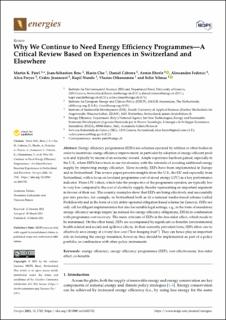Please use this identifier to cite or link to this item:
https://doi.org/10.21256/zhaw-22177Full metadata record
| DC Field | Value | Language |
|---|---|---|
| dc.contributor.author | Patel, Martin K. | - |
| dc.contributor.author | Broc, Jean-Sébastien | - |
| dc.contributor.author | Cho, Haein | - |
| dc.contributor.author | Cabrera, Daniel | - |
| dc.contributor.author | Eberle, Armin | - |
| dc.contributor.author | Federici, Alessandro | - |
| dc.contributor.author | Freyre, Alisa | - |
| dc.contributor.author | Jeanneret, Cédric | - |
| dc.contributor.author | Narula, Kapil | - |
| dc.contributor.author | Oikonomou, Vlasios | - |
| dc.contributor.author | Yilmaz, Selin | - |
| dc.date.accessioned | 2021-03-26T14:47:38Z | - |
| dc.date.available | 2021-03-26T14:47:38Z | - |
| dc.date.issued | 2021-03-21 | - |
| dc.identifier.issn | 1996-1073 | de_CH |
| dc.identifier.uri | https://digitalcollection.zhaw.ch/handle/11475/22177 | - |
| dc.description.abstract | Energy efficiency programmes (EEPs) are schemes operated by utilities or other bodies in order to incentivize energy efficiency improvement, in particular by adoption of energy-efficient products and typically by means of an economic reward. Ample experience has been gained, especially in the U.S., where EEPs have been in use for decades, with the rationale of avoiding additional energy supply by improving energy efficiency. More recently, EEPs have been implemented in Europe and in Switzerland. This review paper presents insights from the U.S., the EU and especially from Switzerland, with a focus on levelised programme cost of saved energy (LPC) as a key performance indicator. These LPC values, which take the perspective of the programme operator, are typically low to very low compared to the cost of electricity supply, thereby representing an important argument in favour of their use. The country examples show that EEPs are being effectively and successfully put into practice, for example, in Switzerland both as (i) a national tender-based scheme (called ProKilowatt) and in the form of a (ii) utility-operated obligation-based scheme (in Geneva). EEPs not only call for diligent implementation but also for suitable legal settings, e.g., in the form of mandatory energy efficiency savings targets (as realised for energy efficiency obligations, EEOs) in combination with programme cost recovery. The main criticism of EEPs is the free-rider effect, which needs to be minimised. On the other hand, EEPs are accompanied by significant co-benefits (environmental, health-related and social) and spillover effects. In their currently prevalent form, EEPs allow one to effectively save energy at a (very) low cost (“low-hanging fruit”). They can hence play an important role in fostering the energy transition; however, they should be implemented as part of a policy portfolio, in combination with other policy instruments. | de_CH |
| dc.language.iso | en | de_CH |
| dc.publisher | MDPI | de_CH |
| dc.relation.ispartof | Energies | de_CH |
| dc.rights | http://creativecommons.org/licenses/by/4.0/ | de_CH |
| dc.subject | Energy efficiency | de_CH |
| dc.subject | Energy efficiency programmes (EEP) | de_CH |
| dc.subject | Cost-effectiveness | de_CH |
| dc.subject | Free-rider effect | de_CH |
| dc.subject | Co-benefits | de_CH |
| dc.subject.ddc | 333.79: Energie | de_CH |
| dc.title | Why we continue to need energy efficiency programmes : a critical review based on experiences in Switzerland and elsewhere | de_CH |
| dc.type | Beitrag in wissenschaftlicher Zeitschrift | de_CH |
| dcterms.type | Text | de_CH |
| zhaw.departement | School of Engineering | de_CH |
| zhaw.organisationalunit | Institut für Nachhaltige Entwicklung (INE) | de_CH |
| dc.identifier.doi | 10.3390/en14061742 | de_CH |
| dc.identifier.doi | 10.21256/zhaw-22177 | - |
| zhaw.funding.eu | No | de_CH |
| zhaw.issue | 6 | de_CH |
| zhaw.originated.zhaw | Yes | de_CH |
| zhaw.pages.start | 1742 | de_CH |
| zhaw.publication.status | publishedVersion | de_CH |
| zhaw.volume | 14 | de_CH |
| zhaw.publication.review | Peer review (Publikation) | de_CH |
| zhaw.webfeed | Energiediskurse | de_CH |
| zhaw.author.additional | No | de_CH |
| zhaw.display.portrait | Yes | de_CH |
| Appears in collections: | Publikationen School of Engineering | |
Files in This Item:
| File | Description | Size | Format | |
|---|---|---|---|---|
| 2021_Patel-etal_Energy-efficiency-programmes_Energies.pdf | 797.11 kB | Adobe PDF |  View/Open |
Show simple item record
Patel, M. K., Broc, J.-S., Cho, H., Cabrera, D., Eberle, A., Federici, A., Freyre, A., Jeanneret, C., Narula, K., Oikonomou, V., & Yilmaz, S. (2021). Why we continue to need energy efficiency programmes : a critical review based on experiences in Switzerland and elsewhere. Energies, 14(6), 1742. https://doi.org/10.3390/en14061742
Patel, M.K. et al. (2021) ‘Why we continue to need energy efficiency programmes : a critical review based on experiences in Switzerland and elsewhere’, Energies, 14(6), p. 1742. Available at: https://doi.org/10.3390/en14061742.
M. K. Patel et al., “Why we continue to need energy efficiency programmes : a critical review based on experiences in Switzerland and elsewhere,” Energies, vol. 14, no. 6, p. 1742, Mar. 2021, doi: 10.3390/en14061742.
PATEL, Martin K., Jean-Sébastien BROC, Haein CHO, Daniel CABRERA, Armin EBERLE, Alessandro FEDERICI, Alisa FREYRE, Cédric JEANNERET, Kapil NARULA, Vlasios OIKONOMOU und Selin YILMAZ, 2021. Why we continue to need energy efficiency programmes : a critical review based on experiences in Switzerland and elsewhere. Energies. 21 März 2021. Bd. 14, Nr. 6, S. 1742. DOI 10.3390/en14061742
Patel, Martin K., Jean-Sébastien Broc, Haein Cho, Daniel Cabrera, Armin Eberle, Alessandro Federici, Alisa Freyre, et al. 2021. “Why We Continue to Need Energy Efficiency Programmes : A Critical Review Based on Experiences in Switzerland and Elsewhere.” Energies 14 (6): 1742. https://doi.org/10.3390/en14061742.
Patel, Martin K., et al. “Why We Continue to Need Energy Efficiency Programmes : A Critical Review Based on Experiences in Switzerland and Elsewhere.” Energies, vol. 14, no. 6, Mar. 2021, p. 1742, https://doi.org/10.3390/en14061742.
Items in DSpace are protected by copyright, with all rights reserved, unless otherwise indicated.